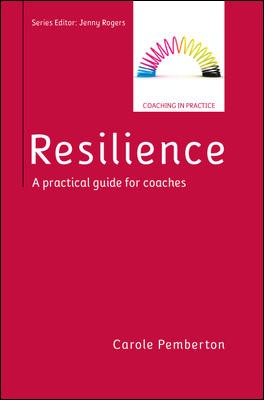What do you do as a coach when your client has been seriously rocked by the events in his or her life?
In Resilience, Carole Pemberton offers a fresh and thoughtful framework for understanding what resilience is and is not, and why it has such potential for triggering feelings of being de-stabilized. Her book takes you step by step through a series of practical interventions, a menu of options, each with their research base and with their practicality explored.
Considering a variety of approaches, Carole Pemberton asks:
- So how far is the currently fashionable concept of mindfulness helpful?
- How can you use some of the principles of Cognitive Behavioural Therapy?
- What can you borrow from Solution-focused Coaching and Positive Psychology?
Reviews:
Her practical guide shows you what is especially useful in these disciplines for work with clients whose resilience has temporarily vanished. You will also learn how to assess your own resilience and coping mechanisms as a coach. The fascinating chapters on client narrative and ‘Narrative Wave’ alone make this a must-read for both new and more experienced coaches. Carole Pemberton explores the essential theories currently influencing resilience coaching, alongside stories from her own reflective practice in applying these and useful coaching tips. – Trevor Elkin, Leadership and Talent Development, Home Office
The resilience of coaching clients is emerging as one of the key themes facing coaches in the 21st Century. Carole Pemberton’s timely work brings together the key facets of this subject providing an understanding of what impacts on resilience for the client and the coach, before providing an overview of a range of useful interventions to apply when working on this issue with clients. – Caroline Horner, MD of the I-coach academy
Wonderful to see a coaching book on resilience that compliments more traditional approaches with emergent thinking from the fields of mindfulness, ACT and positive psychology. Carole shows great wisdom and humility – pointing to the importance of authenticity in teaching mindfulness to others and in sharing her own learning along the way. – Mark McMordie, Director of Coaching, Coachmatch
This is a Treasure Trove of practical, accessible and proven tools for skilled coaches. Carole has created THE definitive guide for helping people to use their enhanced resilience to achieve their potential. – Stuart Lindenfield FRSA, Head of Career and Change Management Solutions, Reed Global
Pemberton has a rare skill – turning knowledge into power. She gives the reader the wherewithal to notice when resilience is failing in their clients. She then equips them with useful lines of inquiry and creative, practical steps they can take with their clients to move them from being stuck to taking responsibility and accessing their resources. She writes of the tricky subject of identity: often a subject tackled in dense philosophical debate: she makes it accessible, giving clear guidance in eloquent plain English about how a coach can work with their client at identity level. The work you as a coach will be able to do as a result of reading this book will be deeper and more creative. My notebook was full of tips and ideas by the time I had left the book. – Deborah Tom, Managing Director of Human Systems
Contents:
- Part 1: Understanding Resilience
- Chapter 1: What is resilience?
- Chapter 2: Start with your own resilience
- Part 2: Working with Resilience Issues
- Chapter 3: Managing Thoughts: Working with CBT
- Chapter 4: ACT- The Power of Acceptance
- Chapter 5: Mindfulness and Resilience
- Chapter 6: A Solution Building Approach to Resilience
- Chapter 7: The Power of Positive Psychology
- Chapter 8: Writing as a Means of Recovery
- Chapter 9: Coaching the Resilience Narrative
- Chapter 10: Career Coaching for Resilience
Author Bio:
Carole Pemberton is Managing Director of Coaching to Solutions and is Visiting Professor in Business Coaching at the University of Ulster.






